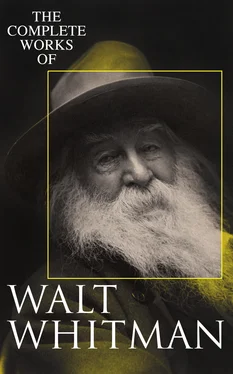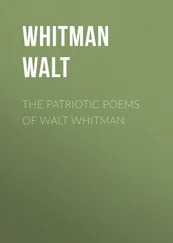Of terror to the tyrant and the priest.
Star crucified — by traitors sold,
Star panting o’er a land of death, heroic land,
Strange, passionate, mocking, frivolous land.
Miserable! yet for thy errors, vanities, sins, I will not now rebuke thee,
Thy unexampled woes and pangs have quell’d them all,
And left thee sacred.
In that amid thy many faults thou ever aimedst highly,
In that thou wouldst not really sell thyself however great the price,
In that thou surely wakedst weeping from thy drugg’d sleep,
In that alone among thy sisters thou, giantess, didst rend the ones
that shamed thee,
In that thou couldst not, wouldst not, wear the usual chains,
This cross, thy livid face, thy pierced hands and feet,
The spear thrust in thy side.
O star! O ship of France, beat back and baffled long!
Bear up O smitten orb! O ship continue on!
Sure as the ship of all, the Earth itself,
Product of deathly fire and turbulent chaos,
Forth from its spasms of fury and its poisons,
Issuing at last in perfect power and beauty,
Onward beneath the sun following its course,
So thee O ship of France!
Finish’d the days, the clouds dispel’d
The travail o’er, the long-sought extrication,
When lo! reborn, high o’er the European world,
(In gladness answering thence, as face afar to face, reflecting ours
Columbia,)
Again thy star O France, fair lustrous star,
In heavenly peace, clearer, more bright than ever,
Shall beam immortal.
Table of Contents
In a far-away northern county in the placid pastoral region,
Lives my farmer friend, the theme of my recitative, a famous tamer of oxen,
There they bring him the three-year-olds and the four-year-olds to
break them,
He will take the wildest steer in the world and break him and tame him,
He will go fearless without any whip where the young bullock
chafes up and down the yard,
The bullock’s head tosses restless high in the air with raging eyes,
Yet see you! how soon his rage subsides — how soon this tamer tames him;
See you! on the farms hereabout a hundred oxen young and old,
and he is the man who has tamed them,
They all know him, all are affectionate to him;
See you! some are such beautiful animals, so lofty looking;
Some are buff-color’d, some mottled, one has a white line running
along his back, some are brindled,
Some have wide flaring horns (a good sign) — see you! the bright hides,
See, the two with stars on their foreheads — see, the round bodies
and broad backs,
How straight and square they stand on their legs — what fine sagacious eyes!
How straight they watch their tamer — they wish him near them — how
they turn to look after him!
What yearning expression! how uneasy they are when he moves away from them;
Now I marvel what it can be he appears to them, (books, politics,
poems, depart — all else departs,)
I confess I envy only his fascination — my silent, illiterate friend,
Whom a hundred oxen love there in his life on farms,
In the northern county far, in the placid pastoral region.
An Old Man’s Thought of School
[For the Inauguration of a Public School, Camden, New Jersey, 1874]
An old man’s thought of school,
An old man gathering youthful memories and blooms that youth itself cannot.
Now only do I know you,
O fair auroral skies — O morning dew upon the grass!
And these I see, these sparkling eyes,
These stores of mystic meaning, these young lives,
Building, equipping like a fleet of ships, immortal ships,
Soon to sail out over the measureless seas,
On the soul’s voyage.
Only a lot of boys and girls?
Only the tiresome spelling, writing, ciphering classes?
Only a public school?
Ah more, infinitely more;
(As George Fox rais’d his warning cry, “Is it this pile of brick and
mortar, these dead floors, windows, rails, you call the church?
Why this is not the church at all — the church is living, ever living
souls.”)
And you America,
Cast you the real reckoning for your present?
The lights and shadows of your future, good or evil?
To girlhood, boyhood look, the teacher and the school.
Table of Contents
Wandering at morn,
Emerging from the night from gloomy thoughts, thee in my thoughts,
Yearning for thee harmonious Union! thee, singing bird divine!
Thee coil’d in evil times my country, with craft and black dismay,
with every meanness, treason thrust upon thee,
This common marvel I beheld — the parent thrush I watch’d feeding its young,
The singing thrush whose tones of joy and faith ecstatic,
Fail not to certify and cheer my soul.
There ponder’d, felt I,
If worms, snakes, loathsome grubs, may to sweet spiritual songs be turn’d,
If vermin so transposed, so used and bless’d may be,
Then may I trust in you, your fortunes, days, my country;
Who knows but these may be the lessons fit for you?
From these your future song may rise with joyous trills,
Destin’d to fill the world.
Italian Music in Dakota
[“The Seventeenth — the finest Regimental Band I ever heard.”]
Through the soft evening air enwinding all,
Rocks, woods, fort, cannon, pacing sentries, endless wilds,
In dulcet streams, in flutes’ and cornets’ notes,
Electric, pensive, turbulent, artificial,
(Yet strangely fitting even here, meanings unknown before,
Subtler than ever, more harmony, as if born here, related here,
Not to the city’s fresco’d rooms, not to the audience of the opera house,
Sounds, echoes, wandering strains, as really here at home,
Sonnambula’s innocent love, trios with Norma’s anguish,
And thy ecstatic chorus Poliuto;)
Ray’d in the limpid yellow slanting sundown,
Music, Italian music in Dakota.
While Nature, sovereign of this gnarl’d realm,
Lurking in hidden barbaric grim recesses,
Acknowledging rapport however far remov’d,
(As some old root or soil of earth its last-born flower or fruit,)
Listens well pleas’d.
Table of Contents
With all thy gifts America,
Standing secure, rapidly tending, overlooking the world,
Power, wealth, extent, vouchsafed to thee — with these and like of
these vouchsafed to thee,
What if one gift thou lackest? (the ultimate human problem never solving,)
The gift of perfect women fit for thee — what if that gift of gifts
thou lackest?
The towering feminine of thee? the beauty, health, completion, fit for thee?
The mothers fit for thee?
Table of Contents
In a little house keep I pictures suspended, it is not a fix’d house,
It is round, it is only a few inches from one side to the other;
Yet behold, it has room for all the shows of the world, all memories!
Here the tableaus of life, and here the groupings of death;
Here, do you know this? this is cicerone himself,
With finger rais’d he points to the prodigal pictures.
Table of Contents
A newer garden of creation, no primal solitude,
Dense, joyous, modern, populous millions, cities and farms,
With iron interlaced, composite, tied, many in one,
By all the world contributed — freedom’s and law’s and thrift’s society,
The crown and teeming paradise, so far, of time’s accumulations,
Читать дальше












